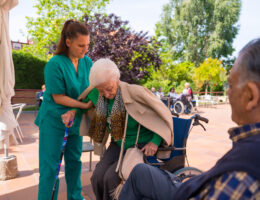In today’s rapidly changing healthcare landscape, travel healthcare jobs represent a dynamic and exciting career path. Whether you’re a seasoned professional or a novice in the field, the opportunities to explore different geographic locations while broadening your career horizons can be hard to resist. This article aims to provide a step-by-step guide to help you embark on this career adventure. Keep reading to learn more.
Understanding the Concept of Travel Healthcare
Before starting your quest for a travel healthcare job, it’s essential to understand its nature and purpose. As the name suggests, travel healthcare professionals move from one location to another, at times crossing state borders, to provide healthcare services for a specific period. This field emerged to address staffing shortages in healthcare institutions, especially those in remote or rural areas, keeping their services efficient and functional.
Working as a travel healthcare practitioner can be a unique and rewarding experience. You get to work in different settings and environments, overcoming new challenges and broadening your skills. Plus, you have a platform to make a substantial difference in communities that require medical assistance the most.
Understanding the concept can help you decide if this career path aligns with your professional and personal goals. Do your research well and consult a staffing agency; you can search for “Prolink travel medical staffing,” which can guide you with inside knowledge and deep industry insights regarding travel healthcare employment and help you land a job.
Acquiring the Essential Qualifications
Just like any other job, travel healthcare jobs demand specific qualifications. These prerequisites vary according to the nature of the position you’re after, whether it’s nursing, occupational therapy, or any other healthcare position.
For nursing travel jobs, the most common requirement is a valid nursing license in the state where you plan to work. In addition to the license, having a certain level of experience is usually necessary. Many travel nursing agencies prefer candidates with at least one year of experience in their specialty area, such as medical-surgical, intensive care, or emergency room nursing.
Occupational therapy travel jobs also have their own set of qualifications. Occupational therapists must have a degree from an accredited occupational therapy program and obtain a state license. Additionally, having certification from the National Board for Certification in Occupational Therapy (NBCOT) is beneficial. This certification is not always required, but it can increase your chances of securing a travel job.
Other travel healthcare positions, such as physical therapists, respiratory therapists, and speech-language pathologists, also require specific qualifications. These may include a degree in the respective field, state licensure, and sometimes certification from professional organizations.
Remember, different states may have specific licensing requirements. It might be necessary to apply for licensure in the respective state where you would be working. In such instances, ensure to start the process early as it could take considerable time.
Honing Essential Soft Skills

While competence in technical skills is crucial in healthcare, soft skills also play a significant role, especially in a travel healthcare job. The ability to adapt quickly to new environments, work cultures, and protocols is essential. You should be flexible and open to adjusting your schedules and routines according to the job’s demands.
Strong communication skills are fundamental in all healthcare jobs. In a travel healthcare role, you often work with diverse populations, communicate health concepts, and promote healthy behaviors. So it’s vital to be clear and convincing in your communication.
Apart from these, emotional intelligence, the ability to cope with different stressors and a keen sense of organization are beneficial soft skills to hone for a successful travel healthcare career.
One of the most valuable soft skills to develop is emotional intelligence. This refers to the ability to understand and manage your own emotions, as well as empathize with others. In the healthcare industry, emotions often run high for patients and their families, and being able to navigate these complex situations with grace and sensitivity is essential. Emotional intelligence also helps to build strong relationships with colleagues and supervisors, fostering a positive work environment and improving patient outcomes.
Another important soft skill for travel healthcare professionals is the ability to cope with different stressors. This can range from managing a heavy workload to dealing with difficult patients or working in high-pressure environments. Developing stress management techniques, such as deep breathing exercises or time management strategies, can help you stay focused and composed in stressful situations. Being able to adapt to different work environments and handle stress effectively not only improves your own well-being but also ensures that you can provide the best possible care to your patients.
Lastly, having a keen sense of organization is crucial for travel healthcare professionals who often work in fast-paced and dynamic settings. This involves prioritizing tasks, managing time effectively, and maintaining accurate records. Keeping track of important information, such as patient records or medication schedules, ensures you can deliver timely and efficient care. Organization also plays a role in maintaining clear communication with colleagues and supervisors, which is essential when working in a travel healthcare setting where you may constantly be changing locations or teams.
Searching for the Right Job
Once you’ve completed the required qualifications, it’s time to venture into the job market. Numerous resources are available to locate travel healthcare job opportunities. Online job boards, company websites, and staffing agencies like Prolink Medical Staffing can provide various job openings in different locations.
Always consider your personal preferences and career goals when seeking a job. Consider factors like location, duration of assignment, compensation, and the particular healthcare setting when comparing different opportunities. Never hesitate to ask questions and clarify your doubts about the job.
While searching for jobs, also take time to prepare your resume and other application materials. These documents should effectively capture your skills, qualifications, and experiences pertinent to the demanded role, creating a positive impression on potential employers.
Taking Pre-Assignment Precautions
Before you set off on your new job, it’s important to take some precautions. When accepting a position, read the contractual parameters carefully. Understand the terms of employment, and the responsibilities you’d be shouldering and clarify any other contractual obligations.
It would be wise to learn about the location, culture, and climate of the area you’ll be working. Understand the healthcare setting and its working ethos. This orientation will help you adapt swiftly to the new job and location.
Making a Great First Impression
Every new job comes with the essential task of making a great first impression. Dress professionally, arrive on time, and be enthusiastic about the role. Show an eagerness to learn and integrate into the team while respecting the existing structure and procedures.
Showcasing adaptability, commitment, and initiative in your work can leave a positive impression on your employer and colleagues. Don’t forget to maintain good relations with the staff and your patients; after all, people skills are paramount in the healthcare industry.
You’re also an emissary of the agency you represent. Reflecting professionalism and sincerity not only raises your personal standing but also the reputation of your agency.
Continuing To Learn and Grow

Last but not least, remember that professional growth in healthcare is a journey, not a destination. Always be open to learning new things and improving your skills. Attend seminars and workshops, network, seek mentors, and continue your education if possible.
Use your experience as a traveling healthcare professional to learn about diverse concerns, innovative solutions, and different clinical practices. This insight can contribute significantly to your career growth, enhancing your competence and strengthening your reputation in the field.
Always remember the more you learn, the more you grow. As an integral part of the healthcare community, your growth often translates into enhanced quality of care delivery and better patient outcomes.
Transitioning into a travel healthcare job might seem daunting initially, but following a structured approach can make this journey smoother. With the right qualifications, skills, and mindset, you can seize the opportunity to explore this exciting path, offering rewarding experiences and countless opportunities for growth.




